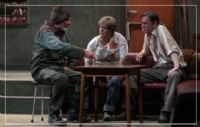The Night Alive...
Date: 15/10/2015
Theatre Review

What makes Dublin born writer and director Conor McPherson's The Night Alive refreshing is that it is driven neither by fixed characterisation nor straightforward drama, but by something else entirely: contradictory individuals trapped in a rigid world.
There is no obvious story structure, only five interesting lives interlinked by who they love, where they live, or both. The Night Alive is as "alive" as its title indicates: it is a gruelling, lively and above all human black comedy, with strong performances across the board.
In prioritising emotional response and eschewing the rules of a typical narrative, McPherson's production reveals what can be drawn from the heart of a play as opposed to its plot. It is as reflective and open to interpretation as one can expect theatre to be, with the admirable credo that characters should be inconsistent and potentially unreliable in order to be believable.
And the very moment one views the messy room that will be the set and centrepiece of the play, it is easy to share and relate to McPherson's train of thought.
Clutter adorns the stage of Belfast's Lyric Theatre, with two unmade beds, at least three bags of rubbish (one hopes), an acoustic guitar propped up in the corner and food that ought not to be there, at least, lying before our eyes. It is all too reminiscent of a student life led by someone who should have grown out of that phase long ago.
So it is for Tommy, portrayed with consummate command by Adrian Dunbar. After dragging a young, bloody nosed woman named Aimee (a sweet, affectingly mistrustful Kate Stanley Brennan) into the house of his uncle Maurice (a dependable Frank Grimes), the door is literally opened for numerous comic and tragic misunderstandings.
In Dunbar's hands, Tommy comes across as a hyperactive, dishonest slob whose efforts to appear as a calm voice of reason are never as convincing as he thinks. Aimee's shaky vulnerability leaves her open to being taken advantage of, and with Tommy at the crossroads of loneliness, a bond between the two is inevitable.
Warmth and friendly intimacy, which reach their heights during a delightful dance to Marvin Gaye, are to be expected. Less expected are the consequences of their little "union", and how the arrival of the childish "Doc" (a hilarious Laurence Kinlan) and Aimee's boyfriend Kenneth (an unsettling Ian-Lloyd Anderson) will reshape the lives of everyone in the play.
McPherson and his gifted cast have great fun defying convention with these characters. It would be easy for The Night Alive to fall into the "all is not what it seems to be" cliché but the play virtually evades this by regularly, if not consistently, keeping the audience guessing. The one truly consistent element of the production is, crucially, its tone: these series of "nights" are alive with physicality, edginess and thoughtfulness, sometimes silly, sometimes suspenseful, but mainly mesmerising.
While certain early exchanges are overplayed, and Ian-Lloyd Anderson isn't quite as prominent as his fellow cast members (though this is more down to the role than the actor), such quibbles are minor in the midst of numerous emergent thematic strands. Is Tommy's connection with Aimee genuine or is he using her as a means to quench his loneliness? Should someone be taken seriously as a moral voice if he is hardly a reliable role model himself?
Then there's Doc. A potentially simplistic comic character at his core, McPherson and actor Laurence Kinlan transform him into a model of infantile confusion and surprising philosophical intelligence. He is, like everyone around him, searching for sanity and stability: the joy and pain of The Night Alive ultimately rests on whether or not these individuals will really find it.
Simon Fahalla
The Night Alive runs at Belfast's Lyric Theatre until Saturday October 31. For more information and tickets go to lyrictheatre.co.uk
There is no obvious story structure, only five interesting lives interlinked by who they love, where they live, or both. The Night Alive is as "alive" as its title indicates: it is a gruelling, lively and above all human black comedy, with strong performances across the board.
In prioritising emotional response and eschewing the rules of a typical narrative, McPherson's production reveals what can be drawn from the heart of a play as opposed to its plot. It is as reflective and open to interpretation as one can expect theatre to be, with the admirable credo that characters should be inconsistent and potentially unreliable in order to be believable.
And the very moment one views the messy room that will be the set and centrepiece of the play, it is easy to share and relate to McPherson's train of thought.
Clutter adorns the stage of Belfast's Lyric Theatre, with two unmade beds, at least three bags of rubbish (one hopes), an acoustic guitar propped up in the corner and food that ought not to be there, at least, lying before our eyes. It is all too reminiscent of a student life led by someone who should have grown out of that phase long ago.
So it is for Tommy, portrayed with consummate command by Adrian Dunbar. After dragging a young, bloody nosed woman named Aimee (a sweet, affectingly mistrustful Kate Stanley Brennan) into the house of his uncle Maurice (a dependable Frank Grimes), the door is literally opened for numerous comic and tragic misunderstandings.
In Dunbar's hands, Tommy comes across as a hyperactive, dishonest slob whose efforts to appear as a calm voice of reason are never as convincing as he thinks. Aimee's shaky vulnerability leaves her open to being taken advantage of, and with Tommy at the crossroads of loneliness, a bond between the two is inevitable.
Warmth and friendly intimacy, which reach their heights during a delightful dance to Marvin Gaye, are to be expected. Less expected are the consequences of their little "union", and how the arrival of the childish "Doc" (a hilarious Laurence Kinlan) and Aimee's boyfriend Kenneth (an unsettling Ian-Lloyd Anderson) will reshape the lives of everyone in the play.
McPherson and his gifted cast have great fun defying convention with these characters. It would be easy for The Night Alive to fall into the "all is not what it seems to be" cliché but the play virtually evades this by regularly, if not consistently, keeping the audience guessing. The one truly consistent element of the production is, crucially, its tone: these series of "nights" are alive with physicality, edginess and thoughtfulness, sometimes silly, sometimes suspenseful, but mainly mesmerising.
While certain early exchanges are overplayed, and Ian-Lloyd Anderson isn't quite as prominent as his fellow cast members (though this is more down to the role than the actor), such quibbles are minor in the midst of numerous emergent thematic strands. Is Tommy's connection with Aimee genuine or is he using her as a means to quench his loneliness? Should someone be taken seriously as a moral voice if he is hardly a reliable role model himself?
Then there's Doc. A potentially simplistic comic character at his core, McPherson and actor Laurence Kinlan transform him into a model of infantile confusion and surprising philosophical intelligence. He is, like everyone around him, searching for sanity and stability: the joy and pain of The Night Alive ultimately rests on whether or not these individuals will really find it.
Simon Fahalla
The Night Alive runs at Belfast's Lyric Theatre until Saturday October 31. For more information and tickets go to lyrictheatre.co.uk
More info : http://www.lyrictheatre.co.uk





































